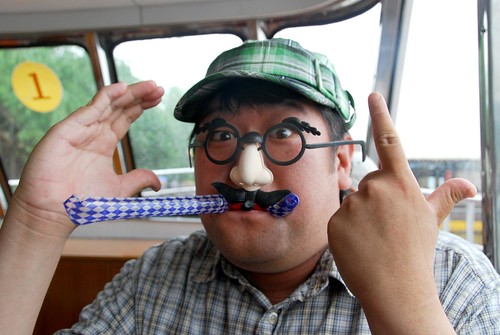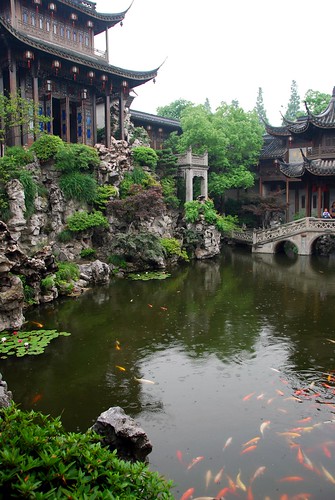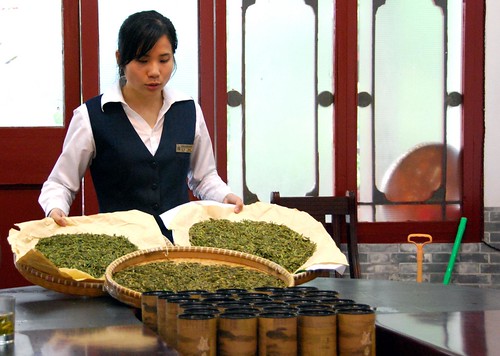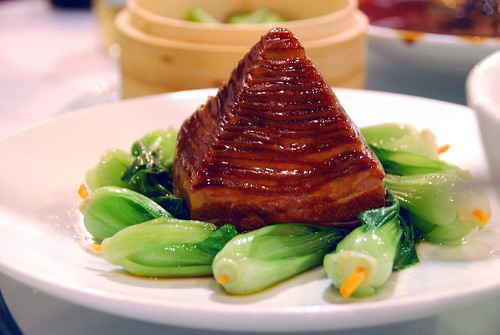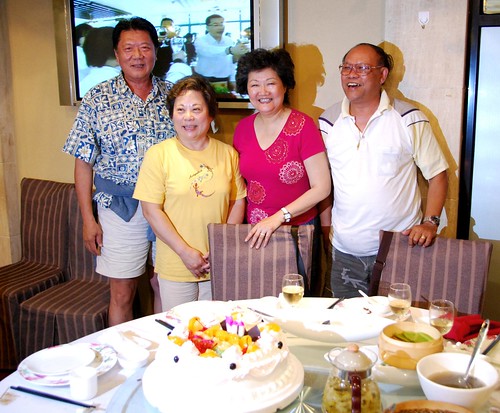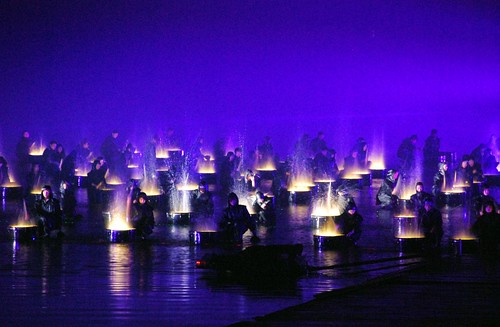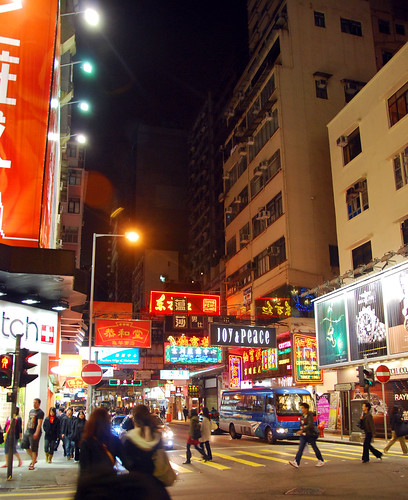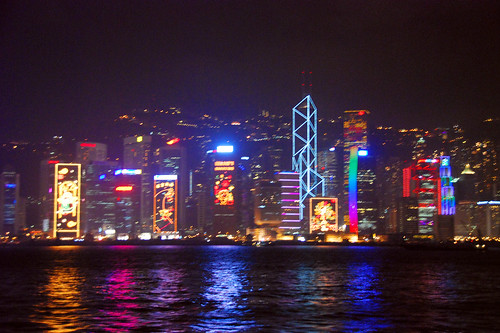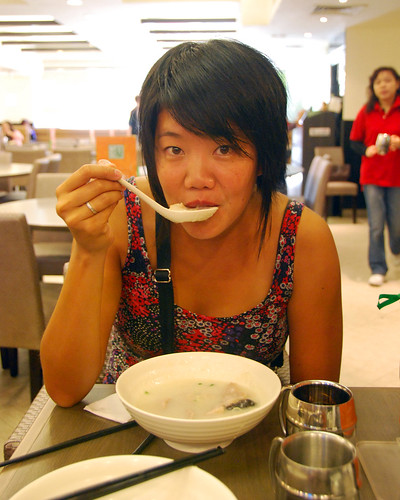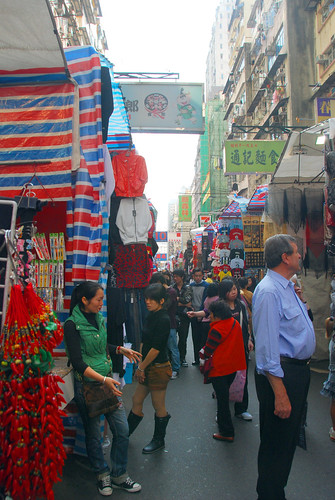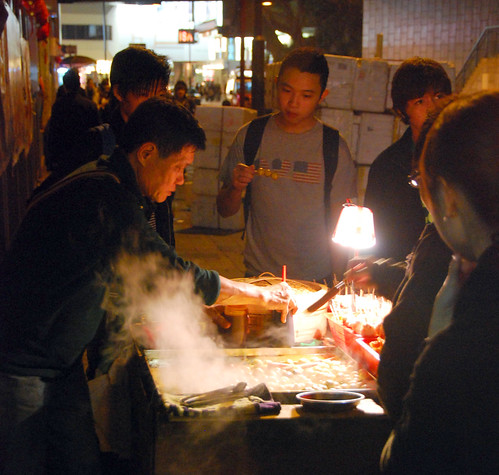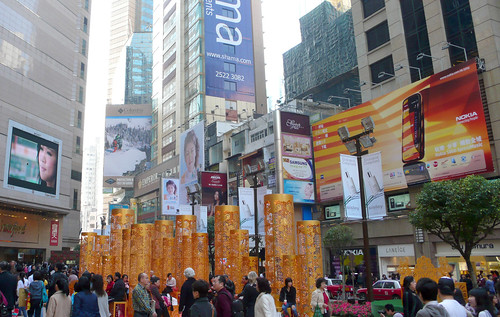China
Next stop on the Meng(hermann) Tour of China…Hangzhou, a large city most famous for its large lake, Xihu (West Lake). We met up with the Frank and the rest of the tour group here, who had already been traveling together for a few days. We got off to a great start—our first meal together was at a restaurant where every dish featured an ingredient used in Chinese medicine, which made for a delicious, healthy, and interesting meal.
We started off the following day with a cruise on West Lake. This is one of China’s most heavily touristed sites, but we had more fun taking pictures of each other in Groucho Marx glasses that I bought for 5RMB each (about US$0.50). Not only were they hilarious, but a hidden blowhole made two streamers pop out either side of your mouth like a mustache.
We all took photos with the glasses, except for Jeremy…seems that the specs are for flat little Asian faces only; the fake nose wouldn’t fit over Jeremy’s Western nose. ![]()
If you want to see the ONE photo I uploaded of East West Lake, look here.
Next we toured an old Chinese house, built by a rich, famous Hangzhou merchant. It was quite opulent, with blue glass windows (unusual in China) and an enormous garden with a koi pond. This estate was very different from the houses we saw in Hongcun and Xidi. Similar to today, it seems that the closer you are to the ocean in China, the richer you can be (though with all the money the Chinese government is currently pouring into the inland cities of Chengdu and Chongqing, this is changing).
As I mentioned previously, on these organized tours, your days are jam-packed with activities. By noon, we had already accomplished what Jeremy and I would consider a full day of sight-seeing activities. But we had much more in store. Next up was a visit to a local, government-owned teahouse. Hangzhou is famous for its Dragonwell green tea, and we were all ushered into a tasting room to learn about the different health-inducing properties of this tea. The woman conducting the tasting was an AMAZING salesperson…she explained the difference between spring, summer, and autumn-harvested tea (spring is best; summer and autumn-harvest leaves are the crappy ones used in teabags), and even let us see and smell the difference for ourselves (spring tea is actually lighter in color than summer and autumn tea).
She explained the difference between A, AA, and AAA grade leaves (they are all spring-harvest leaves, but AA leaves are the small leaves picked from the top of the bush, and AAA leaves are picked from bushes that grow in the wild). AA leaves are about twice as much per kilo as A leaves, and AAA leaves are 4 times as much…but according to the saleslady, you need twice as many A leaves as AA leaves to make a single glass of tea, so the increase in price is moot (a convenient sales tactic).
We learned a lot about tea at this tasting, but it was far more interesting was watching this saleslady do her thing. I have never seen a salesperson with powers as fierce as hers…she knew EXACTLY what to say to convince everyone of the powers of this Dragonwell tea. The pinnacle of her pitch was a demo where she coated some grains of rice with iodine and then tried to wash the iodine off with water (of course, the sludgy brown stuff would not budge). Then, she poured a glass of Dragonwell tea into the cup with the sludgy grains, and the rice turned completely white again (the implication being that this is what the tea will do inside your body—remove the toxins and scrub your insides as clean as a grain of shiny white rice). We learned that with Dragonwell, we should use cold water to make the tea; hot water kills all the polyphenols. She flowed imperceptibly between the demo and the selling portions of the afternoon, and by the time she was ready to sell, everyone was eagerly whipping out their wallets.
The force was strong in her, but she was no match for Chou Mama, the eldest lady on our tour. Chou Mama had about 60 years of bargaining skills on the saleslady, and she used her considerable skills to slowly but surely bargain the sale price down lower and lower. It was like the Clash of the Titans, and we had front row seats!
After we all left with kilos of tea, we took a boat tour of a swampland area, which was quite beautiful and relaxing:
And then toured the beautiful Leifeng Pagoda near West Lake:
But wait, there’s more…we also had an amazing dinner that featured a BACON pyramid, and we celebrated four different May birthdays: my Mom and Dad’s and two other people on the tour with us (Mark and Dolores).
And finally, we ended the looong day by seeing the Impressions West Lake show, directed by Zhang Yimou (the famous Chinese film director who also created the Beijing Opening Ceremonies). The show was the performed ON West Lake (actually on the water), and it retold the tale of a ancient Chinese love story.
The show was visually stunning, but if you are not familiar with the Chinese myth, it can be hard to follow the story, as it is told in a very abstract way. Also, I guess because Jeremy and I had been blown away by the Olympics Opening Ceremony, we thought that the West Lake show would be a lot tighter. Still, it was an excellent experience and you can’t beat seeing a show that is performed ON a body of water.
SCHWOO! It was a long but fulfilling day, and we went to bed happy to have gotten a lot out of Hangzhou.
After two beautiful days spent on Huangshan, we headed down the mountain and drove through Anhui Province’s gorgeous countryside towards two historical villages: Hongcun and Xidi. Though the two villages are clearly set up for tourism now, they still offer a glimpse into how life was once (and, to an extent, still is) lived in China.
In order to enter Hongcun, visitors must cross a long bride over a wide manmade lake:
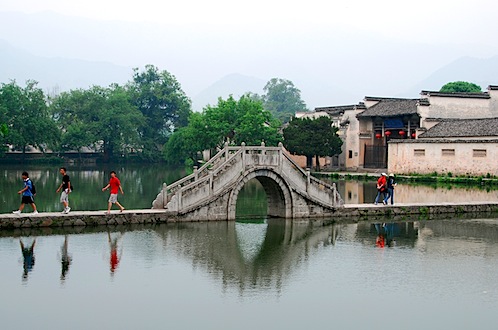
Our tour guide explained that the waterways in this village are quite symbolic: Hongcun’s village plan is built to resemble an ox, with it’s lakes and narrow aquaducts symbolizing the animal’s intestines. A bird’s eye view of Hongcun bears no resemblance to any ox we know of; I guess the village plan is really just an allusion or a metaphor?
At the center of Hongcun is Moon Pond, a crescent-shaped body that is the ox’s “stomach.” Scenes from Crouching Tiger Hidden Dragon were filmed here.
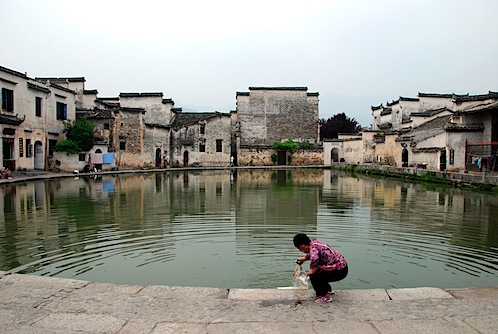
In old China, many villages only housed one family of people; Hongcun was home to the wealthy Wang clan of merchants. Towns consist of private homes as well as temples, where members can go to pay homage to ancestors or gods. We wandered in and out of many old buildings, and saw beautiful carved wood doors and stone fixtures.
But by far the most charming part of Hongcun was the village’s narrow, winding alleys and unexpected views into village life.
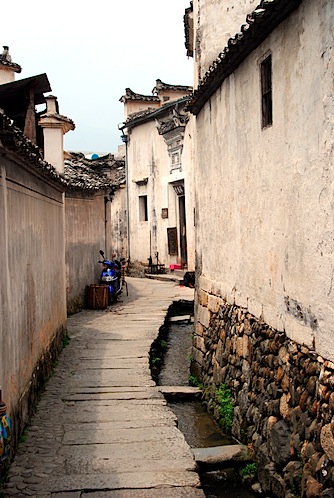
Hongcun’s narrow alleys and waterway “intestines.”
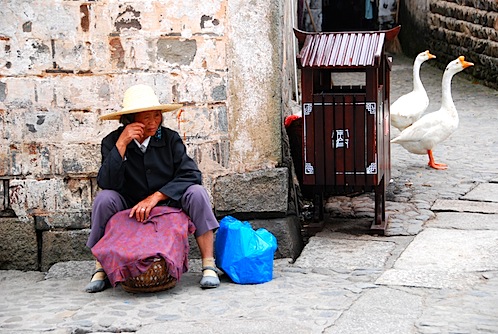
Old vendor lady and geese.
We enjoyed a lovely and delicious lunch at a local farmer’s house, set in an old estate amongst a bamboo forest.
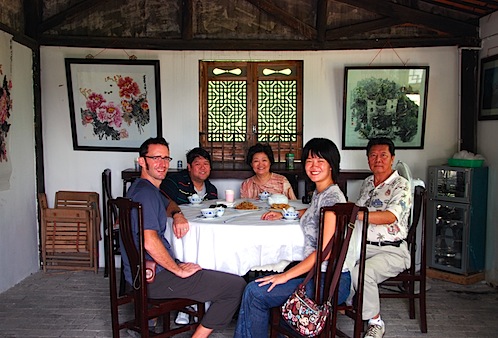
In comparison, Xidi was not as quick to charm, though upon closer inspection, there were many details that caught my eye: a window displaying disintigrating Chinese paper cuttings…
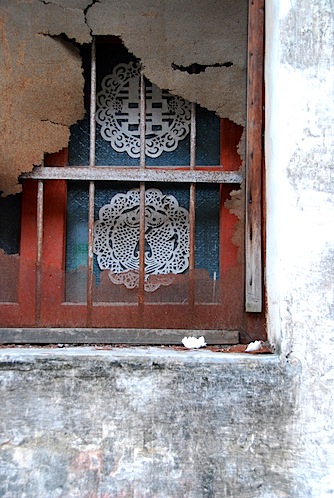
…wooden doors with a surprisingly modernist design (this pattern is apparently meant to look like the cracks in frozen ice):
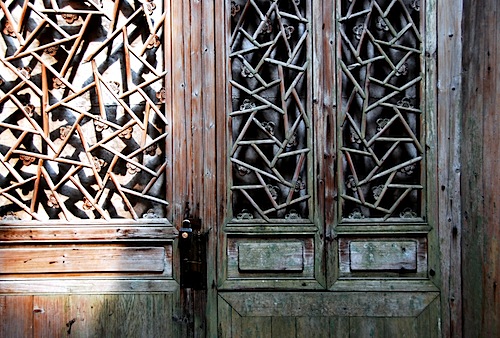
…and an antiques dealer selling vintage locks:
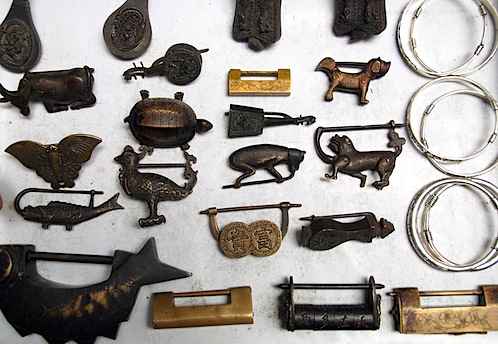
Note the animal-shaped locks; you put a key in the monkey’s/dog’s/lion’s butt to open the lock. Also, the lock in the bottom row, second from the right is an old combination lock using words rather than numbers—you dial in a phrase to unlock its secrets.
It really was a fine day spent enjoying Anhui’s historic villages. We ended with an extensive tea tasting at one of the local teahouses:
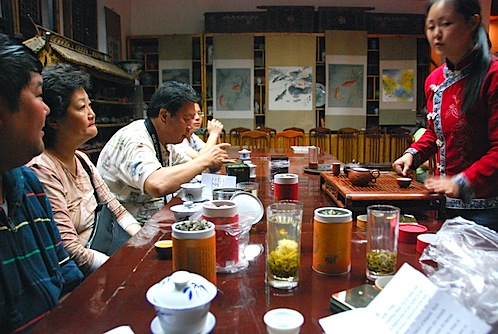
And ate a nice dinner, followed by a birthday cake for my mom, who celebrated her 59th year of life by visiting China for the first time!
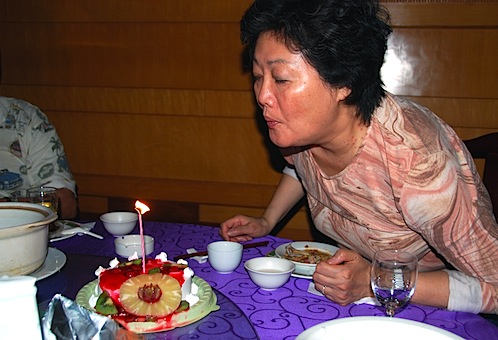
Anhui Province is one of the (if not THE) poorest province in China, but from what we saw, it is also one of the most beautiful. Like my own birthday in Sapa, I am sure this is one celebration my Mom will remember for a lifetime. ![]() Happy Brithday, Mom!
Happy Brithday, Mom!
Note: Hey everyone, let’s give a warm welcome to Eddo! My little bro shares his thoughts as the family travels Huangshan…I love that even though this post is about a mountain, he manages to nerd out on urban planning. Kudos, Eddo! ![]()
As an urban planning nerd/activist, I’ve always been interested in the growth and history of cities. Why did this particularly scenic peninsula morph into modern-day San Francisco? How did the end of the Mississippi River support a multi-ethnic creole population like New Orleans? How did two tiny islands in the middle of the Seine River become a focal point for a global city? How did civilization in the past evolve into its current form, and how do our actions today determine tomorrow’s society?
Anyways, enough of this urban speculation—I promise I’ll get back to it later—let’s get to the heart of this entry. Huangshan (in English, “Yellow Mountain”) is located in the Anhui province of China, and is a major mountain range which has been opened up for tourism. It has inspired countless Chinese poems, literature, and paintings, and deservedly so, because it is one of the most scenic and beautiful places I’ve ever personally experienced.
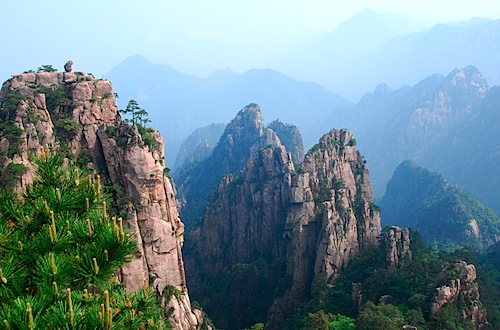
Monkey Rock (the little rock perched on top of the huge stone on the left) overlooking the Valley.
I’ve never been to China before, let alone Huangshan. The last time I was remotely close to China was probably when I was 6 or 7 years old, and was in Taiwan for my Da Jo Jo’s and Da Jo Ma’s wedding. I don’t really recall much from that time, except I liked riding on my youngest uncle’s motorcycle/scooter, and that it was really hot. So for me, Huangshan was not only an eye-opening experience, but also my introduction to China.
China’s problems with rapid modernization and urbanization are well-documented, and I don’t think I need to go into too much detail, but to be introduced to China via its rural and agricultural communities, is, in a word, refreshing. We in America like to glorify a simpler time—when seasonality and locality weren’t just buzzwords for haute cuisine, when communities and societies flourished not because of economic indicators like GDP and inflation rates, but instead on the reliance of individuals in each community to provide a good or service necessary to its citizens. And this is what China is about, I think. Despite its rapid modernization, at the core of all production is people—roads are created by people moving around rocks in wheelbarrows, crops are planted by people leading water buffalo through a field. The concept of labor here is unlike America, where machines have taken over the most difficult of tasks. If there is a resource that China has utilized more so than any other country, it is its people. Performances like the Beijing Olympics Opening Ceremony requiring massive amounts of people, control, coordination, planning, and creative vision, could not have happened anywhere else in the world. Of course, this is both a positive and negative—things are built or created at a frenetic place, but the value of human labor is less than in other countries and services rendered by humans cost exponentially less than anywhere in the West. People are valued less as specialized individuals as they are cogs in a well-oiled economic machine.
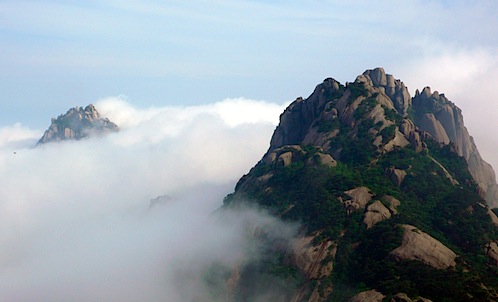
Huangshan’s famous “cloud ocean.” It literally moves in and out in minutes.
Walking through Huangshan is a series of stone steps and pathways meandering along streams, cliffs, forests, and valleys. It is stunning. But you do get a sense of devaluation of individual labor. Couriers or porters carry up all goods that are used by the hotels at the top of the mountains (Ed. note: Indeed, supplies are not allowed to be hauled up the mountain on the gondola—even though it is surely cheaper to mechanize the delivery of these goods—in order to create jobs for local farmers who otherwise wouldn’t be able to earn a decent wage), luggage from tourists, and in some cases, people who cannot walk up or down the grueling paths of the mountain. It is incredible—I can’t imagine the amount energy or labor involved. They get paid by the kilo, and generally balance inhuman amount of goods on a single bamboo stick on their back. Our tour guide told us that they can make up to 1,000 RMB a month (around US$150) which is actually a decent salary in their area. Individuals who work in the hotels on the top of the mountain stay up there for three months at a time, and get free room/board while earning salary.
I don’t know how old the trails and steps of Huangshan are, but one does get a sense of how civilization and societies emerged in the olden days. Locations were picked based on geographic resources, and paths were then created to connect major population centers with each other. Much like cities in America developed along the Mississippi River from Chicago down to New Orleans due to geography and natural resources, I imagine this is how “cities” developed in Huangshan. Except in Huangshan, these “cities” are essentially outdoor plazas with hotels and restaurants, instead of actual cities. But these gathering places and webbed network of paths towards peaks and valleys and sights are in a sense, a microcosm of China, where cities are connected to each other by a network made up of boats, rail, roads, and planes rather than stone steps.
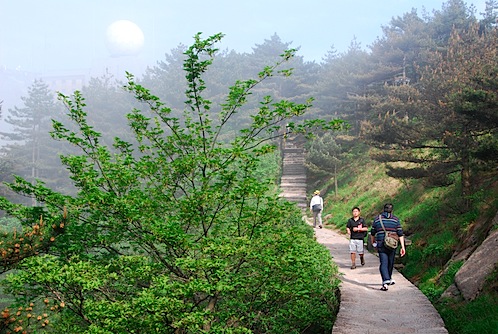
Eddo hiking towards the giant golf ball (on the left, in the background), a weather station located at Huangshan’s highest point.
Huangshan, much like the rest of China, encompasses a scale that I can barely comprehend. It is stunning. It is dramatic. It is imposing and it is spectacular. It is filled with jagged peaks, intense sunrises (which we woke at 4:30 for, climbed up a mountain and after concluding we wouldn’t see it, started hiking back down the mountain, only to see the sun peak through the trees, d’oh!), and ancient trees and wildlife. The Chinese have a saying that Huangshan is number one—after experiencing Huangshan, you need not experience any other mountains. My mother, who was also experiencing China for the very first time (she was born in Taiwan and because of China’s irregular rules on tourism during the Mao era, she hasn’t been able to visit until China became more open in the years after Mao’s death and China’s embrace of capitalism) celebrated her birthday on top of Huangshan. She said “I had always heard of Huangshan ever since I was a little girl but was never able to experience it firsthand until now. I cannot believe that I am celebrating my birthday here. I am so happy.” I think we’d all agree—there is no experience like Huangshan in the world, and despite what you may think about China politically, Huangshan is not just a Chinese treasure, but a treasure for the world.
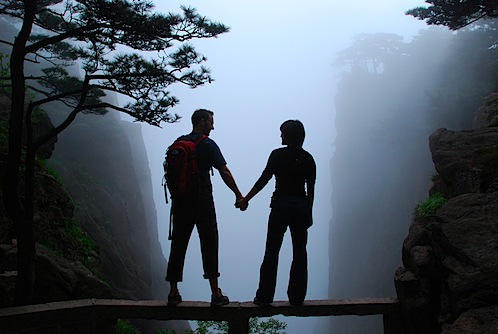
P.S. Here is a link to Eddo’s photos of Huangshan on his Facebook.
After a whirlwind 4 days in Taipei with my parents involving a lot of eating, packing up our stuff and feeling sad, and getting our faces lasered (seriously—me, Momma, and Poppa Meng all had moles removed), the Mengs & Menghermanns boarded a plane for Shanghai! My parents graciously helped organize a tour with Frank, the owner of China Stix, who you may know as The Guy Who Catered Our Wedding. Frank takes tour groups over to China on EATING tours, which is not really that different than joining a normal tour group, except that you gorge yourself on local, gourmet foods at every meal. The Meng(hermann)s will be touring Shanghai and Huangshan on our own before meeting up with the rest of the tour group in Hangzhou.
Our first indication that the family would be traveling together in a different style than Jeremy and I are used to happened as soon as we stepped off the plane. There was someone there to pick us up. I repeat: someone came to pick us up. No wandering around asking where the bus is, no fending off touts trying to sell us overpriced private car rides, no lugging our bags to the curbside to hail a taxi. Now this is the life. ![]()
The second indication that this tour was a whole new ball game happened when we got to the hotel. Our tour guide mentioned that it was a Ramada, so I didn’t think much of it, but when we got there…WOW! As Jeremy said later, “Five stars are definitely better than one.” Apparently, American hotel chains are the cream of the crop in China, even chains that you wouldn’t normally associate with “5 stars” (like Howard Johnson, aka “The HoJo”).
We were in Shanghai for only 24 hours this first time around—Jeremy and I will be returning for a longer stay since we fly out to Japan from Shanghai. J and I like to travel at a moderate pace, and I thought that we weren’t going to see much in 24 hours. But again, this is not your typical Hope and Jeremy tour. We had a tour guide and a driver that whisked us from sight to sight, and darn if we didn’t visit all of the major Shanghai tourist locations (albeit for a short amount of time).
For our first night in town, we went to a Chinese acrobatic show called ERA. Imagine Cirque du Soleil, only more bendy. The feats of flexibility and balance were incredible! Unfortunately, we couldn’t take photos at the show, but suffice to say we were sufficiently astounded by the guy who used his feet to throw bowls onto his head while balancing on a board that was rolling on top of a soup can (yeah, it sounds weird, and it kinda was), the women who could place their butts on top of their heads, and the somersaulting acrobats who could leap 15 feet in the air and backflip through tiny rings. If you’re ever in Shanghai, it’s definitely worth a visit.
The next day, we got up bright and early to hit the town. First stop: our tour guide took us to Nanjing East Road, which is basically a huge shopping street. Jeremy and I didn’t find this very interesting, but I think it does offer a glimpse into the new China. People here like to get their shop on, and they like to do it with big name Western brands. Strangely, luxury brands are more expensive in China than they are in the States, even though everything is made here. Chinese people buy up a storm when they visit the US because everything is so relatively cheap.
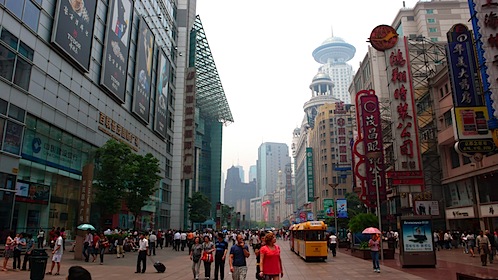
Shanghai’s famous shopping street, Nanjing East Road.
Our next two stops were at “museums” that double as “gift shops.” It seems like the government encourages tour guides to take you to these locations, and the people who run these “gift museums” can be terribly good at the hard sell. We saw some amazing Chinese embroidery, and some Chinese jade carvings. Below is a pixiu, a mythical animal that does not have an anus, so it can take in all the good fortune but never poop it out (I can’t make this stuff up). You are supposed to rub it’s nostrils for good luck, which my Dad is doing here:
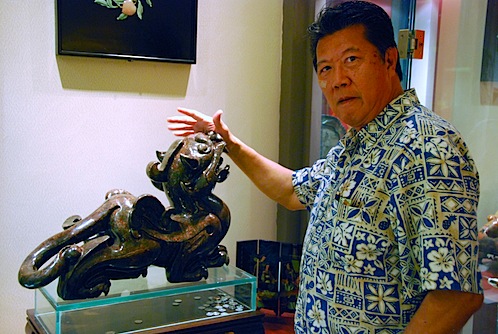
Next, we made our way over to Yuyuan Gardens, a large garden complex that offers a more historical glimpse into Shanghai than Nanjing East Road. Yuyuan is basically a large garden complex packed to the gills with Chinese architecture, koi ponds, famous Chinese rock formations (more on this below), and tourists.
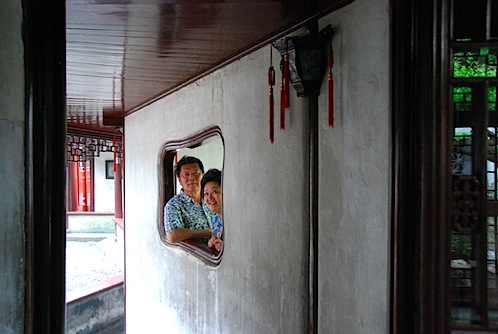
My parents looking cute in Yuyuan Gardens.
Chinese people take their rocks seriously. We learned that in order to be considered “beautiful” to Chinese people, a rock needs to be have four features: shou (it has to be skinny), tou (it has to be transparent), lou (it has to have a bunch of holes), and zhou (it has to be all wrinkled). And it all rhymes! There is one rock in particular in Yuyuan Gardens that everybody freaks out over; shown in this photo:
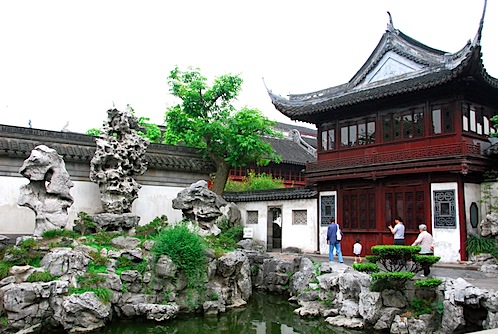
The tallest rock in the photo (second from the left) is know for it’s shou, tou, lou, and zhou qualities.
Yuyuan Gardens also has a huge shopping area with food stalls. We tried Shanghai’s famous xiao long tang bao (soup XLB), which is so big you can drink the soup out of the bun with a straw!
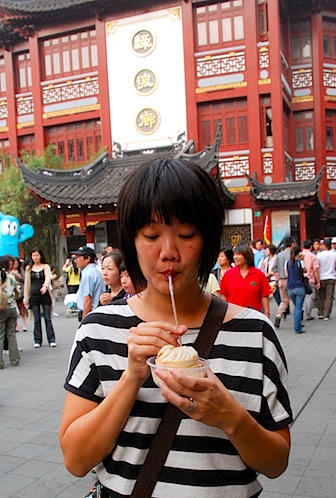
Me trying the famous xiao long tang bao.
We ended our stay in Shanghai with a quick visit to the Bund, a waterfront boardwalk where you can enjoy Shanghai’s famous skyline.
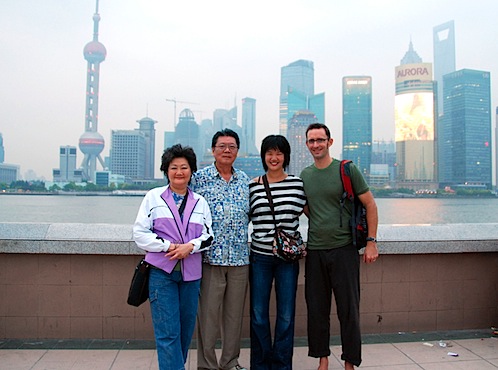
Mengs and Menghermanns Bund’ing it up.
Our stay in Shanghai was brief, but we sure did (and learned) a lot. We’ll see you again soon, Shanghai!
Now, before we get into all the incredible things we’ve seen in China (and we’ve got a LOT to show you), I thought a little intro to the country was in order. If any country deserves a post dedicated entirely to it’s (mis)conceptions, it’s China. I have to admit, we were a little worried about coming here…life is just so good in Taiwan—everyone is helpful and friendly, everything is clean and safe, every place is beautiful/interesting/vibrant. From the stories we heard (and from my previous experience in Beijing in 2000), we were worried that China was going to be dirty/polluted, that the people were going to be rude, and that traveling around the country was going to be just plain difficult.
Of course, the Taiwanese don’t help matters when it comes to disseminating negative opinions about the mainland. For those who are unaware of the story, Taiwan is a democratic nation that considers itself an independent entity; China believes that Taiwan is a part of China. The relationship can be quite contentious; most famously, Jinmen, a Taiwanese island 2km off the coast of Chinese Xiamen, was bombed regularly throughout the 1950s and 60s by the Chinese, but only on every odd-numbered day (the legacy of a weird wartime agreement that China had with Taiwan). As you can imagine, the future of the relationship between the two nations is vehemently debated by their populaces.
Anyway, to say that some Taiwanese think of their big neighbors to the north as heathens would not be too far from the truth. Jeremy and I heard countless stories from Taiwanese people when they found out we were headed off to China. The bathrooms are disgusting!, they said. They fertilize their fields with human poo! The locals will follow you into your bathroom stall to watch you pee (because they are so fascinated with your foreign-ness), so bring an umbrella to shield yourself from their prying eyes! And worst of all, everyone will be mean or try to cheat you.
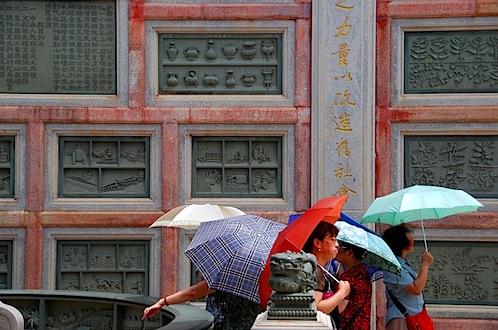
The umbrella brigade, Xiamen.
On top of all these opinions were my own impressions from my first and only visit to the mainland. I went to Beijing in 2000 as a guest of the government. This was when Beijing had just won the 2008 Olympics, and China was trying to promote the country as an international tourist destination. I came here as a bellydancer with my troupe to participate in the International Cultural Tourism Festival, along with 2000 other dancers and musicians from 60 different countries. So, I had a pretty different experience of the place than most visitors back then, but I did (1) use the most disgusting public bathroom I have ever seen (basically a large dirt room with holes dug out of the ground…no doors, of course), and (2) feel the heavy hand of the government. Since we were basically invited there to experience the “new” China and then go home and tell all our friends how awesome it was, we were escorted around all the most famous palaces and gardens in Beijing, and taken to a “farming village,” where all the residents had been given new but poorly built condos (to show how “modern” China had become). Of course, this experience did not do much to improve China’s reputation amongst the San Franciscans I was traveling with; many of them went home with a bad taste in their mouths.
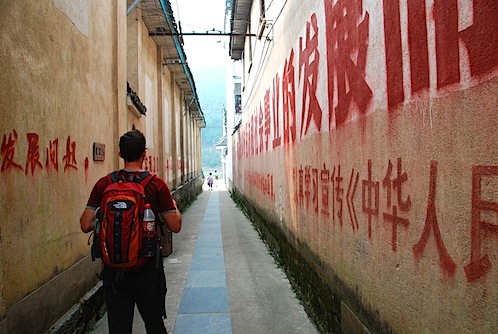
Jeremy and Communist propoganda, Anhui province.
But I stayed on an extra week after everyone else left, and was shown around town by a friend of a friend who lived in Beijing. He was a travel food writer, and was well-connected with the art scene. What I saw during that week left me so impressed with China that I dreamed for a while of moving to Beijing.
Given all that we heard in Taiwan and all that I witnessed in 2000, our expectations kept wavering back and forth between intrigue and trepidation. I imagined that returning to China after 9 years—after the country’s moment of glory during the 2008 Olympics, after the rapid industrialization that has taken place here—that much would be changed. I was not wrong. I mean, I knew it would be different, but in just 10 years, China has become a completely different country: not just the way it looks, but the attitudes of the people. They seem more hopeful somehow, more relaxed, and on the other hand, more imperious, too. I mean, just imagine for a minute that every building in San Francisco was constructed in the last 15 years. Imagine what that kind of rapid change does to a citizen, the amount of national pride they must feel, and how quickly that can turn into conceit. In fact, Frank (the guy who catered our wedding—he was our tour guide for the 2 weeks we traveled with my parents here), who brings American tour groups to China almost every month, let us in on his feelings towards the country: “The structure is all there…the hotels, restaurants, everything is first class. But the people…some of them got too rich too fast. There is a lot of arrogance here.”
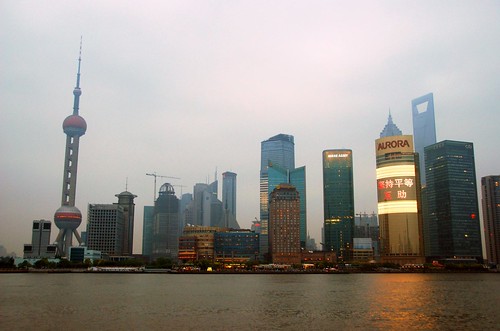
The Bund, Shanghai. The haziness you see in the background is “moisture” in the air, not “pollution.”
Indeed, China does sometimes seem like an awkward teenager whose maturity has not yet caught up with its anatomy. For instance, even in the 5-star hotels and restaurants, the service here can leave a lot to be desired. We had an awkward experience with a bellboy who lingered in our room, waiting to be tipped (even though we later found out that my parents had already tipped him on our behalf). And, most dramatically, the hotel we booked in Xiamen tried to send us to the old wing, until Frank put his foot down and demanded that we be given rooms that we had booked in the newer part of the hotel. Later on, I heard through the tour group grapevine how Frank explained that sometimes the hotels (even the 5-star hotel in Xiamen) will try to pull stuff like this, since most people will just accept it.
Then again, there does seem to be some real effort towards change (or at least the illusion of change). I wouldn’t be surprised if I found out that China had hired some Western consulting company to come in and educate the government about China’s reputation in Europe and America, and then had gone about swiftly changing all these habits/features. Disgusting bathrooms? Well, they’re still here, but they are not nearly as bad as the dirt-ditch-in-the-ground I visited in Beijing in 2000, and they certainly are not in the bigger cities anymore. Our tour guides seem particularly sensitive to the issue (clearly they have been instructed to be on high alert re: this topic), one going so far as to tell us that we should not drink water that day, since we were going into the countryside and he couldn’t guarantee the cleanliness of the bathroom. Air pollution? Well, now that smog in the air has been rebranded as “moisture” (seriously—our tour guide in Shanghai told us that we were not looking at air pollution, but rather, the sky was hazy because it was “very wet, very moisture.” Yeah, right). And of course, Beijing famously went around trying to correct all it’s “Chinglish” signs (one of the things I find most charming about China). We even heard that the Beijing populace was instructed not to wear more than 3 colors at a time (Chinese people tend to wear whatever they happen to pull out of their closets, clashing patterns be damned).
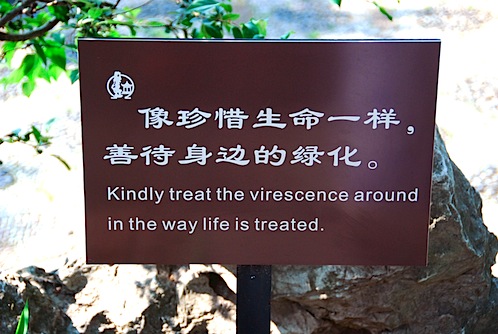
Amazing “Chinglish” in Suzhou, China.
Despite how quickly things change here, the government has not yet managed to stamp out all things distasteful to foreigners. People think nothing of picking their noses in public. Or of hacking up a huge loogey and spitting in right next to your foot. Bumping into you or cutting in line is not even considered rude—Chinese barely even blink an eye when this happens to them. The little kids with giant slits cut into their pants (so they can squat in the street and do their business) are still around, though there are fewer of them.
And the people still idolize Western culture. I can’t tell you how many strangers have come up and asked Jeremy to take a photo with them. Our tour guides keep telling me how “if Jeremy lived here, all the girls here would be calling him” (um, thanks?).
I write about these things not because I find them distasteful, but because China is (as is well documented) in the midst of serious economic and social change. The China that Jeremy and I are experiencing right now may not ever exist again, as the country rapidly reinvents itself (at least on the surface) into a first-world nation. I find this incredibly fascinating. I think it probably turns some people off to see the power of the State, but for me, traveling in China during this time is an awe-inspiring experience.
With all this rapid economic and social turnover, it’s easy to think that China has turned a corner politically as well. But, in fact, there is evidence that the country is still ruled with a heavy hand. There is still a one-child policy (but only in the cities…if you live in the country and your firstborn is a girl, you are allowed to try for another one after 5 years; if you live in the city and you go for a second, you will be fined 100,000RMB—about US$15,000—and your second child’s education will not be paid for by the state). People have had their villages turned into tourist traps with absolutely no compensation from the government (we visited a water village where they charged an entry fee, though the residents were not compensated, and were not even allowed to vend until 4PM). When there was some confusion over one of our flights and we ended up at the wrong airport, the tour bus driver anxiously sped us over to the correct airport, because if we missed our flight, he would be fined.
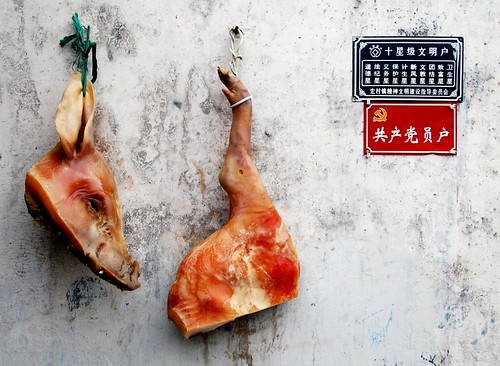
Dry-cured pig parts and a plaque that reads “a Communist lives here.” Hongcun, China.
Still, this is a far cry from the China’s authoritarian past. Many of our tour guides, when showing us around ancient villages, mentioned that much of the town and its ancient relics had been destroyed during the Cultural Revolution. I found this critique of the government interesting, until I realized that the current government was probably trying to distance itself from the destruction and oppression of the Mao era.
All of this is bittersweet to overseas Chinese like my parents. There is real pride from seeing China deliver itself intact from the isolation and poverty of the Mao era, but underneath the surface, some anger and shame lingers over what happened to The Individual during Communist rule. My mother, who was born in Taiwan only one year after her mother (my Popo) had fled China with her KMT Air Force husband, told me that she truly never thought she would be able to come to this country in her lifetime. It was amazing to be here with her and my Dad and to hear the heartbreaking stories of how first the Japanese invasion and then the Communist Revolution broke up my grandparents’ families (all four of my grandparents left home when they were between 14 and 18; only my Nai-Nai, paternal grandmother, ever reunited with her mother—50 years after she left home).
I’m not really sure if there is a clean end to this post, I suppose there really can’t be since our education of China is ongoing. I’m not even really sure if there was a point to this essay, other than to put all my thoughts down in pixels before they get lost in a flurry of activity (and perhaps, buried with a China that will not exist in 10 years). Perhaps I just wanted to document this time so that when we return to the country sometime in the future, we can look back and say, “remember when?” Suffice to say, I am fascinated with every minute of our experience here, and I feel, as descendant of this country’s history, somehow more connected to this place that I did to Australia or Laos, for example. I observe this country with a keener eye and a deeper understanding of its story. And I am learning that I love China as you would love a family member: sometimes they frustrate you, sometimes they challenge you, and sometimes you don’t agree with their actions, but in the end, you still share blood, and that is the tie that will forever bind.
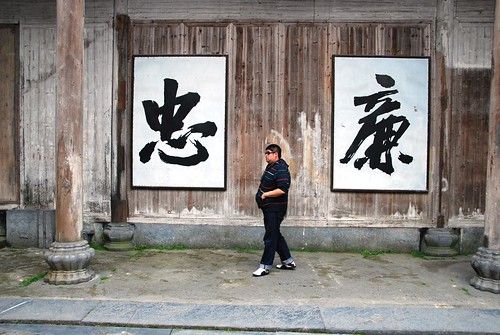
Eddo and “loyalty” (on the left). I don’t know what the word on the right says…Mom? Dad? Help?
We’re about two months into our trip now, and from here on out, the only English-speaking country we will visit is Ireland. We’re headed to Asia—southeast Asia, to be exact…the land of squat toilets, cold showers, mosquito nets, and delicious food. But first…we spent one night in Hong Kong on our way to Thailand, and though 24 hours doesn’t seem like a very long time, it felt like we managed to do quite a bit during our short stay there (we plan on staying a little longer when we fly back through Hong Kong on our way from SE Asia to Taiwan).
We flew from Cairns to Hong Kong on our around-the-world ticket, and then purchased tickets from Hong Kong to Bangkok via AirAsia (http://www.airasia.com), a low-cost Asian airline. It cost us about HKD$2100 (approx. US$300) each for the roundtrip tickets. This is a little more expensive than we expected it to be, but it was the best deal we could find.
We booked a great room at the Mingle Techotel via wotif.com (a GREAT last-minute hotel resource that Jasmine told us about) in the Tsim Sha Tsui district of Kowloon. Random funny: I thought we booked a room at the Mingle “Tee-cho-tel”. It took me a minute to realize it was actually a “tech hotel,” not some weird Mayan hotel in the middle of Hong Kong.
We got in a bit late—it was about 10PM by the time we took the train into Kowloon and then the taxi to our hotel, but the place was absolutely alive like it was a Friday night (it was Tuesday). The streets were packed with people shopping (the stores don’t close until about 11PM here), eating at the food stalls, and generally hanging out with friends.
We walked around Tsim Sha Tsui and headed towards the boardwalk, where you can see Hong Kong across Victoria Harbour.
We were pretty exhausted from our long flight and headed back to the hotel after an hour or so. But when we laid down and turned on the TV, what was on but the inauguration! We had to stay up and see our new president get sworn into office. So, right there in our Hong Kong hotel room, we watched as Barack Obama took the presidential oath. It’s a strange thing traveling as Americans during this time…Jeremy and I have been to South and Central America, Asia, and Europe before, but this is the first time as travelers that we feel proud to be Americans. Everywhere we have been, people have been very supportive of Obama. We felt really patriotic watching the inauguration, thinking that we were sharing this moment with millions of people, not just in the US, but around the world. It was 1:30AM Hong Kong time when Obama finally finished his speech, but it was worth the wait. ![]()
The next morning, rested and reassured that things were getting kicked off back home, we enjoyed a great breakfast—I had jook (they call it congee here) with pork and pickles, Jeremy had wonton soup. Yum!
Jeremy and I split up for the day—he wanted to see if he could exchange his North Face day pack (which is already falling apart after 2 months), and I wanted to go shopping (it’s official, I am sick of my clothes). Hong Kong is a shopping haven…in fact, I’m not sure what else people do in Hong Kong! It seems like people are just buying things all day long. So, I headed towards Mong Kok, while Jeremy took the subway into Hong Kong.
I found a street market with lots of clothing stalls and found a few cute items. Of course, I had to bust out the Mandarin when negotiating (even though most people speak Cantonese in HK)—I figured that speaking English can only end in a higher price. I may have gotten totally robbed, but both the saleslady and I were happy with the deal so that’s a good bargaining session in my book.
I also had a chance to sample some of the Hong Kong street food while I was out and about. Some of it was a little scary-looking (fish balls stewing in a curry sauce?), but I was able to point at some delicious deep-fried dumplings and some pork meatballs on a stick. Yum!
Jeremy had a good day downtown too, though we were both pretty exhausted after our day on the town. The sheer number of people in this city makes simply walking the streets a huge effort. This is good practice for the rest of Asia, though…at least there are sidewalks in Hong Kong!
Thanks for the great day, Hong Kong! We’ll see you soon…
